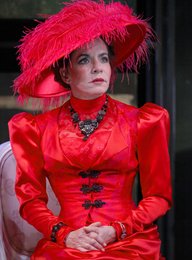There are many ways of delivering the most famous exasperation from Wilde’s last play, although most actors tend to go with robust indignation. Not so Stockard Channing who, as Lady Bracknell, responds to Jack Worthing’s (Keenan) tale of abandonment on the Brighton line with a barely audible “A handbag?”, rapidly swallowed up with a sharp intake of breath. An understated take, to be sure, but with such a well-known play, packed full of witticisms and aphorisms with a life of their own, it’s the little things that make a difference.
.jpg.aspx%3Fwidth=260&height=190) The importance of being Stockard Channing is such that the audience expects her to supplement this popular role with some of the steely sassiness characteristic of her more familiar film and television appearances, whether Rizzo in Grease (all those years ago, but still…) or more recently Abigail Bartlet in The West Wing. That is to say, if anyone was going to bitingly bellow “A HANDBAG?” and stand apart from the ensemble, please let it be Channing. Surprisingly, in place of high drama she gives us quite a subdued Bracknell, shuffling and slight, who dissolves into the cast rather than leading it.
The importance of being Stockard Channing is such that the audience expects her to supplement this popular role with some of the steely sassiness characteristic of her more familiar film and television appearances, whether Rizzo in Grease (all those years ago, but still…) or more recently Abigail Bartlet in The West Wing. That is to say, if anyone was going to bitingly bellow “A HANDBAG?” and stand apart from the ensemble, please let it be Channing. Surprisingly, in place of high drama she gives us quite a subdued Bracknell, shuffling and slight, who dissolves into the cast rather than leading it.
Wilde’s drama of hidden and fabricated identities both mocks Victorian society and, some would say, foreshadows his own outing. (Four days after the play’s opening on Valentine’s day 1895, the Marquess of Queensberry sent a note to Wilde’s club reading “For Oscar Wilde, posing sodomite” which set in motion his trials.) While Conall Morrison’s cross-dressed take at the Abbey in 2005 forced a queer subtext to take shape, Parker’s production is less strained, taking the script at face value and hoping that Wilde’s dialogue will speak for itself.
While the period costuming and muffled British accents are in keeping with expectations, a couple of design and directorial choices stand out. For one, the set is a busy, rather anachronistic creation that does little to illuminate the action. Large panels jut out to varying degrees from metal scaffolding, painted in earthy shades of red and terracotta, with the odd splash of pastels. These are adorned with dots, squiggles and Celtic swirls, not unlike the canvasses a scrimping landlord might pick up to cover a damp patch. It’s up to the dresses and headpieces to convey a sense of opulence, and Eimer Ní Mhaoldomhnaigh’s design does the trick. Gwendolen’s (Duffin) pink patent shoes might have been plucked straight from Topshop, but for the colour infusion alone, this can be forgiven.
Another nuanced take is Merriman, Worthing’s butler played by Daly. Speaking with a clipped, Cornish inflection, he is styled like Johnny Depp’s Mad Hatter, complete with bushy red hair and a whitened complexion. During a slick scene change, when the panels realign to indicate the outdoors, he even makes an entrance on roller blades. You couldn’t say it worked, but following a brief whistling interlude during Gwendolen’s tea with Cecily (Reeves), Daly wins a sudden round of applause for his quirkiness.
 It would perhaps have been more obvious to cast Duffin as Cecily and Reeves as Gwendolen, but when the bristling banter kicks off between them, it doesn’t really matter who’s who. They are well on the way to being sisters, you see. We can be forgiven for hoping they’d exaggerate their roles a bit more – that both claim they could only love someone called Earnest is the ridiculous heart of the piece, and it deserves to be milked for all of its comic worth. Providing the complementary double-act, Nolan’s Algernon is lively and pompous, while Keenan’s Worthing is more frazzled than he is charming.
It would perhaps have been more obvious to cast Duffin as Cecily and Reeves as Gwendolen, but when the bristling banter kicks off between them, it doesn’t really matter who’s who. They are well on the way to being sisters, you see. We can be forgiven for hoping they’d exaggerate their roles a bit more – that both claim they could only love someone called Earnest is the ridiculous heart of the piece, and it deserves to be milked for all of its comic worth. Providing the complementary double-act, Nolan’s Algernon is lively and pompous, while Keenan’s Worthing is more frazzled than he is charming.
Despite playing the role with restraint, it is clear that Channing has the audience on her side. A few moments into the second half, she walks on stage in a scorching red dress that raises some gasps, and manages to elicit a rapturous applause when she struggles to shake off an awkwardly tied scarf.
However, it is Methven, as batty Miss Prism, who raises most laughs on the night, and gives the production a much needed energy lift before the end of the first half. Her words skip registers, especially when excited or in the presence of Canon Chasuble (Kelly), whom she not-so-secretly adores. She plays to caricature more than any of the other actors, amplifying the humour and reminding us that it is social satire, after all, and that some things, and types, never change.
Fintan Walsh is a post-doctoral researcher at the School of Drama, Trinity College Dublin. He is ITM’s staff writer.